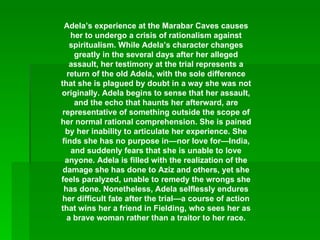Irn
- 1. Passage to India Author: E. M. Forster Miguel Angel Arellano English IV AP Independent Reading Novel
- 2. Two Englishwomen, the young Miss Adela Quested and the elderly Mrs. Moore, travel to India. Adela expects to become engaged to Mrs. Moore’s son, Ronny, a British magistrate in the Indian city of Chandra pore. Adela and Mrs. Moore each hope to see the real India during their visit, rather than cultural institutions imported by the British. Summary At the same time, Aziz, a young Muslim doctor in India, is increasingly frustrated by the poor treatment he receives at the hands of the English. Aziz is especially annoyed with Major Callendar, the civil surgeon, who has a tendency to summon Aziz for frivolous reasons in the middle of dinner. Aziz and two of his educated friends, Hamidullah and Mahmoud Ali, hold a lively conversation about whether or not an Indian can be friends with an Englishman in India. That night, Mrs. Moore and Aziz happen to run into each other while exploring a local mosque, and the two become friendly. Aziz is moved and surprised that an English person would treat him like a friend.
- 3. Mr. Turton, the collector who governs Chandrapore, hosts a party so that Adela and Mrs. Moore may have the opportunity to meet some of the more prominent and wealthy Indians in the city. At the event, which proves to be rather awkward, Adela meets Cyril Fielding, the principal of the government college in Chandrapore. Fielding, impressed with Adela’s open friendliness to the Indians, invites her and Mrs. Moore to tea with him and the Hindu professor Godbole. At Adela’s request, Fielding invites Aziz to tea as well. At the tea, Aziz and Fielding immediately become friendly, and the afternoon is overwhelmingly pleasant until Ronny Heaslop arrives and rudely interrupts the party. Later that evening, Adela tells Ronny that she has decided not to marry him. But that night, the two are in a car accident together, and the excitement of the event causes Adela to change her mind about the marriage.
- 4. Not long afterward, Aziz organizes an expedition to the nearby Marabar Caves for those who attended Fielding’s tea. Fielding and Professor Godbole miss the train to Marabar, so Aziz continues on alone with the two ladies, Adela and Mrs. Moore. Inside one of the caves, Mrs. Moore is unnerved by the enclosed space, which is crowded with Aziz’s retinue, and by the uncanny echo that seems to translate every sound she makes into the noise “boum.” Aziz, Adela, and a guide go on to the higher caves while Mrs. Moore waits below. Adela, suddenly realizing that she does not love Ronny, asks Aziz whether he has more than one wife—a question he considers offensive. Aziz storms off into a cave, and when he returns, Adela is gone. Aziz scolds the guide for losing Adela, and the guide runs away. Aziz finds Adela’s broken field‑glasses and heads down the hill. Back at the picnic site, Aziz finds Fielding waiting for him. Aziz is unconcerned to learn that Adela has hastily taken a car back to Chandrapore, as he is overjoyed to see Fielding. Back in Chandrapore, however, Aziz is unexpectedly arrested. He is charged with attempting to rape Adela Quested while she was in the caves, a charge based on a claim Adela herself has made.
- 5. Fielding, believing Aziz to be innocent, angers all of British India by joining the Indians in Aziz’s defense. In the weeks before the trial, the racial tensions between the Indians and the English flare up considerably. Mrs. Moore is distracted and miserable because of her memory of the echo in the cave and because of her impatience with the upcoming trial. Adela is emotional and ill; she too seems to suffer from an echo in her mind. Ronny is fed up with Mrs. Moore’s lack of support for Adela, and it is agreed that Mrs. Moore will return to England earlier than planned. Mrs. Moore dies on the voyage back to England, but not before she realizes that there is no “real India”—but rather a complex multitude of different Indias. At Aziz’s trial, Adela, under oath, is questioned about what happened in the caves. Shockingly, she declares that she has made a mistake: Aziz is not the person or thing that attacked her in the cave. Aziz is set free, and Fielding escorts Adela to the Government College, where she spends the next several weeks. Fielding begins to respect Adela, recognizing her bravery in standing against her peers to pronounce Aziz innocent. Ronny breaks off his engagement to Adela, and she returns to England.
- 6. Two years later, Aziz has become the chief doctor to the Rajah of Mau, a Hindu region several hundred miles from Chandrapore. He has heard that Fielding married Adela shortly after returning to England. Aziz now virulently hates all English people. One day, walking through an old temple with his three children, he encounters Fielding and his brother‑in‑law. Aziz is surprised to learn that the brother-in-law’s name is Ralph Moore; it turns out that Fielding married not Adela Quested, but Stella Moore, Mrs. Moore’s daughter from her second marriage. Aziz befriends Ralph. After he accidentally runs his rowboat into Fielding’s, Aziz renews his friendship with Fielding as well. The two men go for a final ride together before Fielding leaves, during which Aziz tells Fielding that once the English are out of India, the two will be able to be friends. Fielding asks why they cannot be friends now, when they both want to be, but the sky and the earth seem to say “No, not yet. . . . No, not there.”
- 7. Character Analysis Adela Quested Adela arrives in India with Mrs. Moore, and, fittingly, her character develops in parallel to Mrs. Moore’s. Adela, like the elder Englishwoman, is an individualist and an educated free thinker. These tendencies lead her, just as they lead Mrs. Moore, to question the standard behaviors of the English toward the Indians. Adela’s tendency to question standard practices with frankness makes her resistant to being labeled—and therefore resistant to marrying Ronny and being labeled a typical colonial English wife. Both Mrs. Moore and Adela hope to see the “real India” rather than an arranged tourist version. However, whereas Mrs. Moore’s desire is bolstered by a genuine interest in and affection for Indians, Adela appears to want to see the “real India” simply on intellectual grounds. She puts her mind to the task, but not her heart—and therefore never connects with Indians.
- 8. Adela’s experience at the Marabar Caves causes her to undergo a crisis of rationalism against spiritualism. While Adela’s character changes greatly in the several days after her alleged assault, her testimony at the trial represents a return of the old Adela, with the sole difference that she is plagued by doubt in a way she was not originally. Adela begins to sense that her assault, and the echo that haunts her afterward, are representative of something outside the scope of her normal rational comprehension. She is pained by her inability to articulate her experience. She finds she has no purpose in—nor love for—India, and suddenly fears that she is unable to love anyone. Adela is filled with the realization of the damage she has done to Aziz and others, yet she feels paralyzed, unable to remedy the wrongs she has done. Nonetheless, Adela selflessly endures her difficult fate after the trial—a course of action that wins her a friend in Fielding, who sees her as a brave woman rather than a traitor to her race.
- 9. Biography Edward Morgan forster was born into a comfortable London family in 1879. His father, an architect, died when Forster was very young, leaving the boy to be raised by his mother and great‑aunt. Forster proved to be a bright student, and he went on to attend Cambridge University, graduating in 1901. He spent much of the next decade traveling and living abroad, dividing his time between working as a journalist and writing short stories and novels. Forster’s style is marked by his sympathy for his characters, his ability to see more than one side of an argument or story, and his fondness for simple, symbolic tales that neatly encapsulate large‑scale problems and conditions. These tendencies are all evident in A Passage to India , which was immediately acclaimed as Forster’s masterpiece upon its publication. It is a traditional social and political novel, unconcerned with the technical innovation of some of Forster’s modernist contemporaries such as Gertrude Stein or T.S. Eliot. A Passage to India is concerned, however, with representing the chaos of modern human experience through patterns of imagery and form. In this regard, Forster’s novel is similar to modernist works of the same time period, such as James Joyce’s Ulysses ( 1922 ) and Virginia Woolf’s Mrs. Dalloway ( 1925 ).
- 10. Works Cited Forster, E. M. A Passage to India . Orlando: Harcourt Brace & Company, 1924. Print. "E. M. Forster." Wikipedia . 2010. Web. 25 Feb 2010. <http://en.wikipedia.org/wiki/E._M._Forster>.









